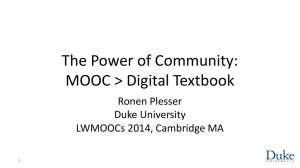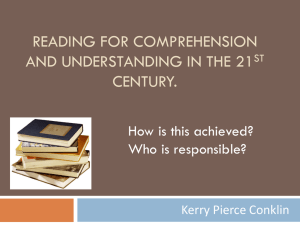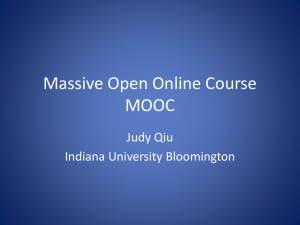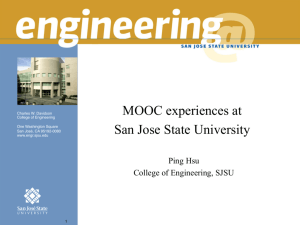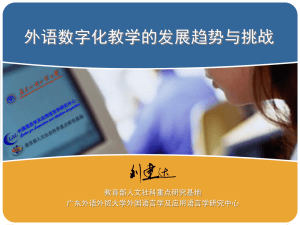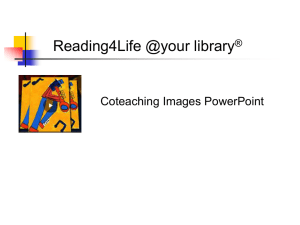Coteaching
advertisement
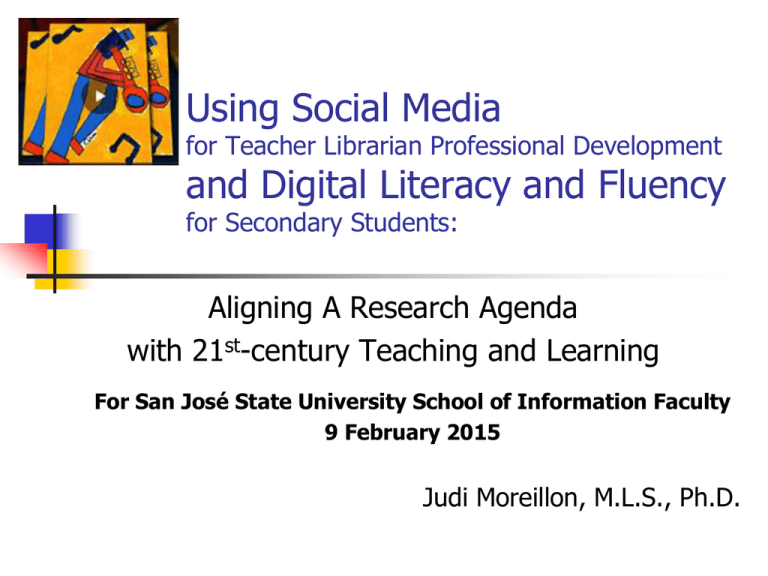
Using Social Media for Teacher Librarian Professional Development and Digital Literacy and Fluency for Secondary Students: Aligning A Research Agenda with 21st-century Teaching and Learning For San José State University School of Information Faculty 9 February 2015 Judi Moreillon, M.L.S., Ph.D. Objectives At the end of this presentation, you will have information about my research stream: Applications to Best Practices in LIS Online Education: Competencies-aligned LIS Education Increasing Interactivity in the Online Learning Environment #txlchat Netnography App Project Possible Grant-funded Research Opportunity Competencies Aligned LIS Education: Digital Storytelling Based on the Association for Library Service to Children Competencies: A Learning Activity to Promote Values Associated with Social Justice Created at Tagxedo.com ALISE Conference 2015: Mirrors and Window: Reflections on Social Justice and Library Science Education http://judimoreillon.wikispaces.com/jm-alise-15 Access… a place to begin the social justice conversation… Keywords and Phrases from the ALSC Competencies How does your advocacy story relate to the concept of social justice? Keywords and Phrases from Students’ Responses Word clouds created at Wordle.net Competencies Aligned LIS Education: “All teachers [librarians] are political, whether they are conscious of it or not. Their acts contribute to or challenge the status quo in literacy education, in school, and in society” (Shannon, 1992, p. 2). Created at Tagxedo.com Shannon, P. (Ed.). (1992). Becoming political: Readings and writings in the politics of literacy education. Portsmouth, NH: Heinemann. Increasing Interactivity in the Online Teaching Environment: ApprenNet: Video-enhanced Online Learning Experiences TWU Teaching and Learning Symposium 2014 http://increasinginteractivity.wikispaces.com Accepted Article forTechTrends – publication date May 2015 Increasing Interactivity in the Online Teaching Environment: “It was nice to have a change.” “Yes, because it’s different [from the LMS discussion board].” “It was harder than the ‘regular’ discussion… As a viewer I was much more interested than with the usual discussion board postings.” Increasing Interactivity in the Online Teaching Environment: “This tool gives [online] students a chance to practice their speaking skills instead of always focusing on their writing skills.” “In a society where image and communication go hand-in-hand, tools that allow us to refine our personal communication styles and receive feedback are important and useful.” http://info.apprennet.com/all-voices-heard-all-ideas-considered/ Online Professional Development for Teacher Librarians Texas School Librarians’ Twitter-based Community of Practice: A Netnographic Study of #txlchat: http://tinyurl.com/txlchatjm Online Professional Development for Teacher Librarians Netnography (Kozinets, 2010) Data Sources: Interviews with Innovators and Core Group Conducted and Recorded in Blackboard Collaborate Psychdata Survey Open to All #txlchat Participants http://tinyurl.com/txlchatsurvey Weebly Site: Archives and Additional Information/Resources http://txlchat.weebly.com Online Professional Development for Teacher Librarians App for Secondary School Students Narrative under construction Production consideration talks have begun Ownership issues to be addressed The tool will be the basis for field tests and research (after final production). Pappas, C. (Ed.) (2014). How gamification reshapes learning. eLearning Industry. Available from http://elearningindustry.com Future Grant-funded Research Coteaching MOOC + Badging = Success Premise: When teacher-librarians “see” coteaching in practice, they will be more likely to initiate and better able to sustain instructional partnerships with classroom teachers. Future Grant-funded Research Using a MOOC to Badge School Librarians for Exemplary Practice in Coteaching Badging Experience: http://teksalign.pbworks.com Future Grant-funded Research SJSU iSchool MOOC Experience Stephens, M. & Jones, K. M. L. (2014). MOOCs as professional development platforms: Evaluating and refining SJSU’s first not-for-credit MOOC. Journal of Education for Library and Information Science 55 (4): 345-361. Future Grant-funded Research Susan Hildreth Library 2.014 Presentation Institute of Museum and Library Services Blog Digital Badging: An Opportunity for Libraries and Museums (2014, March 19) http://blog.imls.gov/?p=4691 “Participatory, Continuous, Connected: Top Trends from Library 2.014” moderated by Dr. Michael Stephens IMLS Priorities Grant search: “professional development” 163 since 1997 “MOOC” – none… Professional development is a priority of the teacher librarian profession. Link for Additional Information http://judimoreillon.wikispaces.com/sjsu_research_presentation Judi Moreillon info@storytrail.com http://storytrail.com @CactusWoman buildingacultureofcollaboration@edublogs.org References Hildreth, S. (2014, Mar. 19). Digital badging: An opportunity for libraries and museums. Retrieved from http://blog.imls.gov/?p=4691 Johnson, G. (2014). The ecology of interactive learning environments: Situating traditional theory. Interactive Learning Environments, 22(3), 298-308. Kozinets, R. V. (2010). Netnography: Doing ethnographic research online. Los Angeles, CA: Sage. Marzano, R. (2007). The art and science of teaching. Alexandria, VA: Association for Supervision and Curriculum Development. Moreillon, J. (2014, Nov. 17). All voices heard, all ideas considered. Retrieved from http://info.apprennet.com/all-voices-heard-all-ideas-considered Pappas, C. (Ed.) (2014). How gamification reshapes learning. eLearning Industry. Available from http://elearningindustry.com Shannon, P. (Ed.). (1992). Becoming political: Readings and writings in the politics of literacy education. Portsmouth, NH: Heinemann. Stephens, M. & Jones, K. M. L. (2014). MOOCs as professional development platforms: Evaluating and refining SJSU’s first not-for-credit MOOC.” Journal of Education for Library and Information Science, 55(4), 345-361. Vygotsky, L. (1980). The mind in society: The development of higher psychological processes. Cambridge, MA: Harvard University Press. Wenger, E. (1998). Communities of practice: Learning, meaning, and identity. Cambridge, UK: Cambridge University Press.
